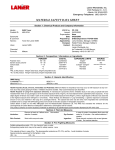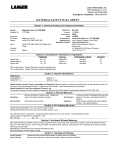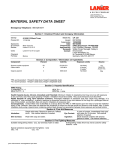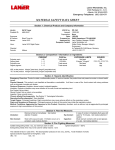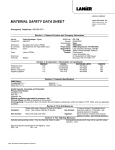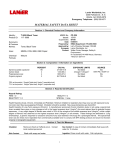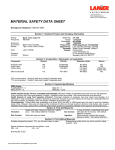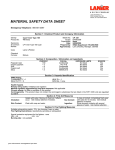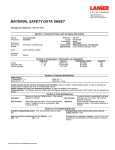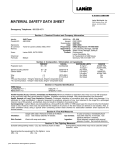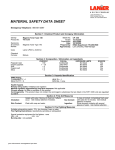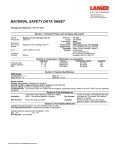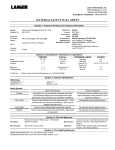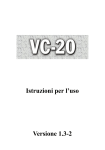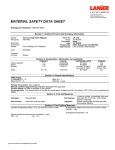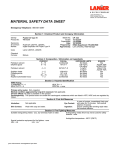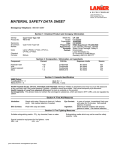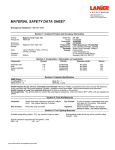Download Lanier MILO 60 User's Manual
Transcript
Lanier Worldwide, Inc. 2300 Parklake Drive, NE Atlanta, GA USA 30345-2979 MATERIAL SAFETY DATA SHEET Emergency Telephone: 800-551-3087 Section 1: Chemical Product and Company Information Identity: Product ID: LDD 020 / 030 Maroon Ink 480-0115 Synonyms & Common Names: Maroon Ink for Lanier LDD 020 / 030 Printer Uses: Lanier LDD 020, LDD 030, LDD120 Chemical Formula: Mixture MSDS No. Issued: Supersedes: Date: Prepared by: Approved by: European Contact: CP- 358 11/08/2006 07/05/2002 11/08/2006 EH&S Department 770-496-9500 Larry Choskey, Manager, CEH&S Walter Fricke, Manager, Safety & Environment, Lanier Worldwide, Inc. Im Taubental D-41468 Neuss, Germany +49-2131-387-177 Section 2: Composition / Information on Ingredients Water Petroleum Solvent Ethylene Glycol Watchung red Sorbitan fatty acid esters PERCENT 55 – 65 5 – 15 8 – 12 2 – 10 3–6 CAS No. 7732-18-5 64742-71-8 107-21-1 15782-05-5 8007-43-0 EXPOSURE LIMITS Not listed Not Listed Not listed Not listed Not listed SOURCE N/a N/a N/a N/a N/a Section 3: Hazards Identification HMIS Rating: FLAMMABILITY = 1 REACTIVITY = 0 HEALTH = 1 SPECIAL = none Health Hazards, Immediate and Potential): Primary Entry Routes: Inhalation: No Skin: Yes Ingestion: No Medical conditions aggravated by exposure: Not applicable Chronic Effects: Not applicable Carcinogenicity: This product does not contain carcinogenic substances which are listed in NTP, IARC, and are regulated by OSHA. Section 4: First Aid Measures Inhalation: Not applicable in normal use Eye Contact: Skin Contact: Wash thoroughly with soap and water. Ingestion: Try to remove with eye drops or flush with water. If unsuccessful, get medical attention. Induce vomiting. If unsuccessful get medical attention. Section 5: Fire Fighting Measures Suitable extinguishing media: CO2, dry chemical, foam or water. Autoignition Temperature: approximately 420°C Special protective equipment for fire fighters: none UEL: n/a LEL: n/a your document management partner Extinguishing media which may not be used for safety reasons: none MATERIAL SAFETY DATA SHEET Page 2 of 3 CP-358 Section 6: Accidental Release Measures Spill / leak Procedures: If spilled, wipe up with paper or cloth. Miscellaneous: Keep product out of sewers and watercourses. Personal protection: Avoid prolonged or repeated contact with skin. Cleanse thoroughly after contact. Product is readily removed from skin by waterless hand cleaners followed by washing with soap and water. Section 7: Handling and Storage Special Handling: Special Storage: Prohibit stacking sideways and upside down. Prohibit dropping or throwing. Avoid direct sunlight. Keep out of reach of children. Avoid storage under -5°C and above 40°C. Keep from freezing. Section 8: Exposure Control and Personal Protection Information: Respiratory Protection: none required under normal use. Hand Protection: none required under normal use. Eye Protection: none required under normal use. Skin Protection: none required under normal use. Section 9: Physical and Chemical Properties CHARACTERISTICS: Appearance: Form: Odor: Solubility in Water: Specific gravity: Density: Maroon red Paste No strong odor Insoluble N/a Approximately 1.0 g/cm3 Melting point: Vapor pressure: Vapor density: Evaporation rate: Boiling point: N/a N/a N/a N/a N/a Section 10: Stability and Reactivity Conditions to avoid: none Materials to avoid: none Hazardous decomposition products: will not occur Stability: Stable Section 11: Toxicological Information: Acute skin irritation: Moderate irritant Acute Eye Irritation: Not applied Acute oral toxicity: 5000mg/kg (rat) Acute allergenic effects: non-skin sensitive Special effects: Carcinogenicity: Negative Mutagenicity: Negative Effects on reproductive system: No data is available on this product Teratogenic: No data Section 12: Environmental / Ecological Information Acute toxicity to fish: Not available Persistence/Degradability: Not known Algae inhibition test: Not available Bioaccumulation: Not known in bioaccumulation Acute toxicity to daphnia: Not available Section 13: Disposal Consideration Used ink should be disposed of under conditions that meet all federal, state and local environmental regulations. Disposal regulations vary from locality to locality; therefore consult your local Lanier office or the EPA to determine the proper method for disposal. Section 14: Transportation Information International regulations: RID/ADR Not applicable DOT 49 CFR Not applicable ADNR Not applicable ICAO-TI/ATA-DGR UN Classification Number IMDG Code Not applicable Not applicable Not applicable Specific precautionary transport measures: Avoid direct sunlight. Do not keep over 40°C (104°F). Keep from freezing. Specific material to avoid: None in normal use. Information on this data sheet represents our current data and best opinion as to the proper use in handling of this product under normal conditions. On the basis of the data available to us, this product is not a dangerous substance. One should, however, observe the usual precautionary measures for dealing with chemicals. MATERIAL SAFETY DATA SHEET Page 2 of 3 CP-358 Section 15: Regulatory Information Regulation: Not known Section 16: Miscellaneous Information Judgment as to the suitability of information contained herein for user’s purposes is the responsibility of the purchaser. Therefore, although reasonable care has been taken in the preparation of this information, Lanier Worldwide, Inc. extends no warranties, makes no representations, and assumes no responsibility as to the accuracy or suitability of such information for application to user’s intended purposes or for consequences of its use. All materials may present unknown hazards and should be used with caution. Although certain hazards are described herein, we do not guarantee that these are the only hazards that exist. Information on this data sheet represents our current data and best opinion as to the proper use in handling of this product under normal conditions. On the basis of the data available to us, this product is not a dangerous substance. One should, however, observe the usual precautionary measures for dealing with chemicals.



